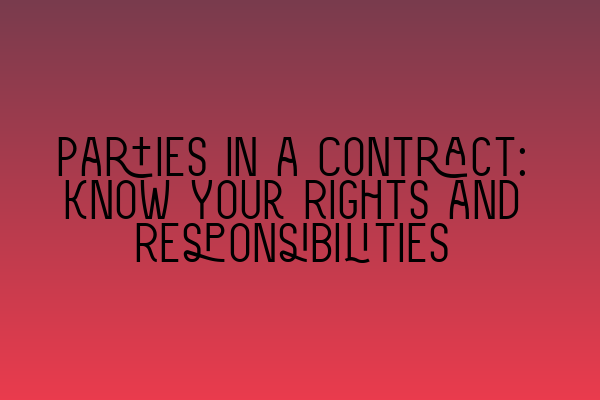Parties in a Contract: Know Your Rights and Responsibilities
When entering into a contract, it is essential to understand the rights and responsibilities of all parties involved. A contract is a legally binding agreement between two or more parties, and it is important for everyone to be fully aware of their obligations. By knowing your rights and responsibilities, you can ensure that the contract is fair and protects your interests.
What are the parties in a contract?
A contract typically involves two main parties: the offeror and the offeree. The offeror is the party who makes the offer, and the offeree is the party who receives the offer. These parties are essential in the formation of a contract as they exchange promises or agreements.
Within these roles, there may also be agents representing each party. An agent acts on behalf of the principal (offeror/offeree) and has the authority to bind the principal in contractual relationships.
Rights and responsibilities of the offeror
As the offeror, you have specific rights and responsibilities:
- The right to revoke the offer: Until the offer is accepted, the offeror has the right to withdraw or revoke the offer. However, it’s crucial to note that revocation must be communicated effectively to the offeree.
- The responsibility to make a valid offer: The offer must be clear, definite, and communicated to the offeree. It should include the essential terms and conditions of the contract.
- The right to specify the mode of acceptance: The offeror has the right to specify how the offeree should communicate their acceptance, such as through email, written letter, or in person.
It is essential for the offeror to draft and present a clear and unambiguous offer to avoid any confusion or disputes later on. If you need assistance with creating a valid offer, consider seeking professional legal advice or taking an SQE preparation course.
Rights and responsibilities of the offeree
As the offeree, you also have specific rights and responsibilities:
- The right to accept or reject the offer: You have the right to accept or reject the offer made by the offeror. However, it’s important to note that silence or inaction generally cannot be considered as acceptance.
- The responsibility to communicate acceptance: If you decide to accept the offer, you must communicate your acceptance to the offeror within a reasonable time frame and in the manner specified by the offeror.
- The right to negotiate: In some cases, you may have the right to negotiate the terms of the contract with the offeror. This allows you to reach a mutually beneficial agreement that meets the needs and expectations of both parties.
It is crucial for the offeree to carefully review the terms of the offer before accepting it. If there are any concerns or issues with the offer, it is advisable to seek legal advice or consider taking an SQE preparation course to gain a better understanding of contract law.
Importance of understanding rights and responsibilities
Understanding your rights and responsibilities in a contract is crucial for several reasons:
- Legal protection: By knowing your rights, you can ensure that the contract protects your interests and is enforceable in a court of law if necessary.
- Preventing misunderstandings: Clear communication of rights and responsibilities helps prevent misunderstandings and potential contract disputes.
- Negotiation advantage: Understanding your rights allows you to negotiate better terms and conditions that benefit you and your business.
When it comes to contract law, knowledge is power. The more you know about your rights and responsibilities, the better equipped you are to navigate and negotiate contracts successfully.
For further assistance in preparing for your contract law examinations or to gain a deeper understanding of contract law principles, consider enrolling in SQE 1 preparation courses or SQE 2 preparation courses. These courses can provide you with the necessary knowledge and skills to excel in your legal career.
Remember, contracts are legally binding documents, and it is crucial to approach them with care and understanding. Taking the time to know your rights and responsibilities will ensure that you enter into fair and favorable agreements that protect your interests.
References:
